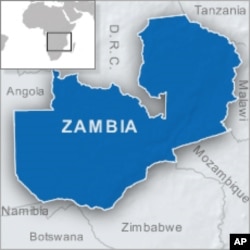Zambia has launched a ten-year program to circumcise more than 2.5 million men in an effort to curb HIV, the virus that causes AIDS. But the effort faces challenges from religious groups and others who say there’s not enough evidence to support that circumcision curbs AIDS.
14% of all Zambians are infected, and less than 20% of all males are circumcised.
Male circumcision is not unknown in Zambia, and some ethnic groups in the northwest practice it widely including the Luvale and Luanda.
But many are opposed to it on religious or traditional grounds, and others say as a way to prevent HIV, it just does not work. They say there is no scientific evidence that male circumcision is reliable in slowing the spread of HIV / AIDS.
One of the skeptics is James Mwamba, an activist in the capital of the northwestern province of Solwezi. He is HIV-positive:
“If you go to area where circumcision is practiced, you still find a good number of people that are HIV-positive. We have seen an increase in people seeking the service, but it’s mostly for hygiene reasons.”
But scientists around the globe and leading groups fighting the disease say studies show that circumcised men are less likely to become infected. They say it’s likely that cells in a man’s foreskin are vulnerable to the virus and that susceptibility is reduced, but not eliminated, when the foreskin is removed.
The international agency UNAIDS says male circumcision can reduce the risk of HIV infection up to 60 percent in heterosexual intercourse.
Public health and research director for Zambia’s health ministry, Dr. Victor Mukonka says, “Male circumcision is an effective new intervention amongst many others in the fight against HIV and AIDS available today for reducing the risk of HIV transmission.”
He adds that it has the potential to contribute greatly to reducing the incidence of HIV in Zambia over the coming decades.
The health ministry is also identifying role models like school teachers, to get the message across to the public.
Paul Mushimbalume is a teacher at Naboye High School in Kafue district, about 45 kilometers from Lusaka. He says he’s undergone male circumcision, and that he takes 5 or 6 minutes before or after class to talk to pupils about the procedure. It’s encouraging, he says, to see most of his students willing to consider circumcision to prevent the transmission of HIV.
More than 200 doctors, clinical officers and nurses have been trained to perform the procedure, says Dr. Mukonka of the Ministry of Health. Zambia has scaled up male circumcision in 36 out of 73 districts, and health specialists hope to have more than 2.5 million males circumcised over the next 10 years.
The United Nations’ report last year indicated that universal male circumcision in sub-Saharan Africa could prevent 5.7 million new infections and three million deaths over 20 years.




